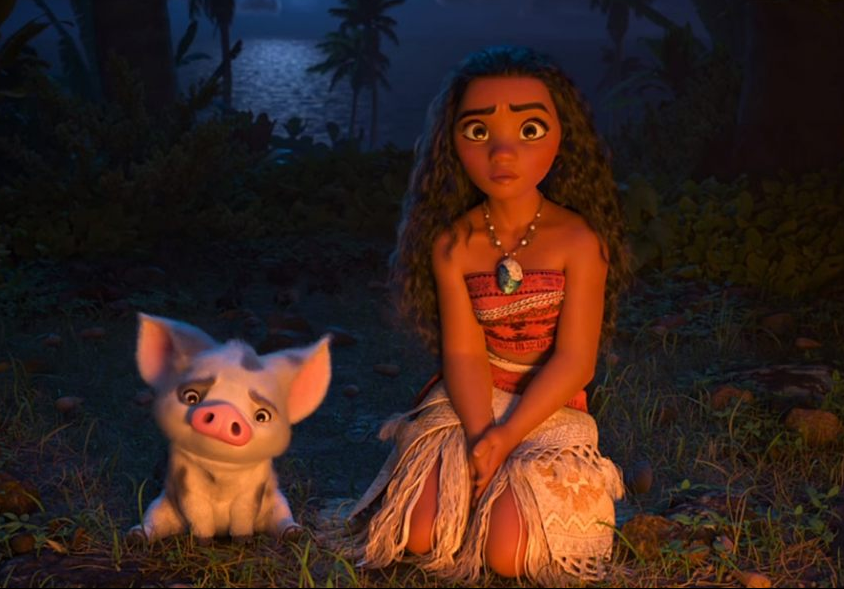Three years after the cultural phenomenon that was Frozen, Disney’s newest “princess” movie isn’t about a princess at all.
It’s about a chief, perhaps the first female in her village to be so but it’s hard to be sure as directors John Musker and Ron Clements (who collaborated on The Little Mermaid, Hercules, and Aladdin) never address it. After the heart of Tahini (mother-nature?) is stolen by demigod Maui (voiced by Dwayne Johnson), the health of chief Moana’s (voiced by Auli’i Cravalho) island has been deteriorating, to the point where she must leave her people, set out beyond the safety of the reef, and venture into the unknown to find Maui and return the heart.
Moana fills a lot of the Disney-princess requirements. From the beginning of the movie, it’s apparent that she’s different — the water she is named after befriends her, chooses her to embark on an adventure that will save her people; she is headstrong, independent, and searching for her identity (the question of “Who am I?” is a recurring theme), which she finds in the identity of her ancestors.
But this isn’t a typical Disney princess movie, or even a typical Disney movie. Rather, it’s indicative of a changing Disney, perhaps not as changed nor as self-willed as we would like, but it is change nonetheless.
Moana is the product of a self-aware, self-mocking Disney that is relatively culturally sensitive. This is evident from the five years of production that went into Moana, the fact-checking groups made up of local Pacific Islanders to ensure the story stayed true to culture, and the voices behind the characters belonging almost exclusively to Pacific Islanders. It’s based on true history and mythology: set 2,000 years ago, the movie tries to answer the mystery behind a 1,000-year chunk of time when the greatest sailors and navigators in the world stopped sailing. Despite the arguably offensive Halloween costume that was released leading up to the movie (a full body suit of the character Maui — tattoos, skin color, muscles, skirt, and all — in what some have equated to blackface), it seems as though Disney has made a conscious effort to avoid cultural appropriation with this movie.
It’s self-aware in its jokes about princesses and musicals, jokes that break the barrier between audience and movie. Defending his joke that Moana is a princess (despite her being a chief), Maui cracks that “if you have a dress and an animal sidekick,” you’re a princess — a shout-out to Disney’s history with and qualities of princesses. Maui himself quite literally wears his emotions on his sleeve, with an animated “Mini Maui” tattoo that darts across his skin and serves as his conscience and emotional giveaway.
Maui also draws attention to the singing, hinting at resignation if Moana breaks into song again. A musical at heart, the singing also differs from Disney’s past. With Lin-Manuel Miranda writing many of the songs, there is an interesting tug-of-war that goes on. Miranda tries to maintain the beat and song style that brought him to fame, but Disney refuses to let their voice get drowned out in the mix. What results is a weird, boppy tune for most of the songs; this, of course, won’t prevent them from becoming hits, but they may never reach Frozen-level fame. This could also be due to the fact that Disney stayed true to voice and character throughout the singing. When Moana’s grandmother is singing, it sounds like a grandmother singing. It’s not beautiful and auto-tuned; it’s real, with authenticity being a trend Disney wanted to maintain throughout the movie.
Moana also makes subtle adjustments that reflect today’s changing social atmospheres. In the trailer is a clip of Maui correcting Moana on his introduction: he is a “hero of man” in addition to being a demi-god, etc. In his full correction, Maui almost immediately changes his statement to include both men and women and eventually “all.” Maui being “hero of all” rather than just men and women is perhaps Disney’s subtle way of joining the push against a gender-binary culture. The approach to Moana’s role as the first female chief is appreciatively subtle as well: by not making a big point out of it, they render the adjustment a natural occurrence rather than something that had to be fought for. It enforces to a young audience the idea that women in power is not abnormal, that it is not something that should have to be fought for.
There’s also no love interest in Moana, which is a breath of fresh air. Disney holds tight to the themes of family, of necessary rebellion, and consequential heroism, in this strong-girl-saves-world-with-some-help-from-friends story. The real star of the movie was a chicken named Hei Hei, who has been described (by Gizmodo) to be the dumbest character Disney has ever created. Hei Hei adds humor and light complication to the story through his dumbness by eating the wrong thing at the right time or marching blindly toward danger.
At the end of the day, though, this is still a Disney movie. Everyone unrealistically and conveniently speaks English; the songs are anachronistic in genre. They continue to set unrealistic beauty standards for both girls and boys (no one’s eyes are that big). But they also enforce the importance of history, equality, identity and independence. Moana is entertaining, and interesting, and worth a watch. It’s approach toward race is something worth having an opinion on, but the laughs Moana provides make it easy to forget larger issues and render it a wholly enjoyable experience. And come winter, when plush Hei Hei’s are being doled out and everyone’s singing, Moana will be inescapable, and you’ll want to sing along. It is a Disney movie, after all.





